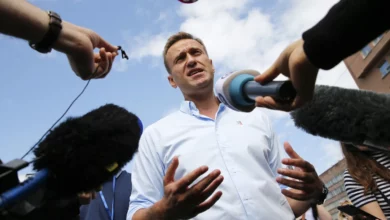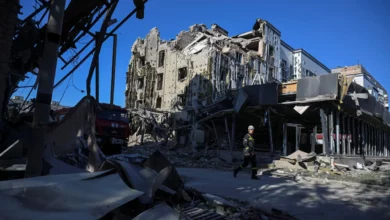
A defiant Russia dismissed Wednesday unprecedented Western sanctions over Ukraine after Brussels and Washington unveiled the toughest punitive measures against the Kremlin since the Cold War.
The third round of US and EU sanctions aims to force Russia to change tack and halt its support of separatists in Ukraine by targeting its vital financial, arms and energy sectors.
But Russia's first deputy prime minister, Igor Shuvalov, made light of the restrictions, also designed to hit the oligarchs in Russian President Vladimir Putin's inner circle.
"And what about the sanctions? In for a penny, in for a pound," he quipped to journalists.
Financial institutions put on a brave face, saying their operations would not be affected, while a top official unleashed a diatribe against the administration of US President Barack Obama.
"Obama will go down in history not as a peacemaker — everyone has already forgotten about his Nobel Peace Prize — but as a US president who started a new Cold War," Alexei Pushkov, chairman of the foreign affairs committee at the Russian parliament's lower house, said on Twitter.
There was no immediate official reaction from Putin's office or the foreign ministry but Moscow has long insisted sanctions would merely bring Russia's society together and make its economy more self-reliant.
The stepped-up sanctions came as Moscow dismissed claims it was responsible for supplying the missile that downed Malaysia Airlines flight MH17, and fighting in Ukraine showed little sign of abating.
They will notably make it tougher for Russian state-owned banks to access European financial markets, forcing their costs higher and hobbling an already struggling economy.
Russia's Central Bank said that financial institutions were working normally and that if necessary it would adopt measures to protect targeted lenders which include the country's second-largest bank VTB.
'Driven into corner'
Economists have warned that Europe's own economy would suffer too from the so-called sector sanctions against its biggest source of energy and its major trading partner.
Despite the dismissive talk in Moscow, a number of economists acknowledged the new restrictions would be painful to absorb for Russia, and could stoke social tensions as its economy is sliding towards a recession.
"The current amount of corporate debt is 700 billion dollars, these debts should be refinanced," Igor Nikolayev, head of the FBK Strategic Analysis Institute, told AFP, pointing to a lack of cheap loans in Russia.
Nikolai Petrov of the Moscow-based Higher School of Economics said that this time the sanctions would be felt by everyday Russians — and predicted they would drive an even greater wedge between him and the West.
"The confrontation will increase abruptly. Putin has been practically driven into a corner and this man does not make concessions under pressure," he told AFP.
'Strong warning'
Some EU diplomats have also expressed concerns, warning sanctions may convince Putin that he no longer has anything to lose by further escalating the Ukraine conflict.
Obama denied the West was being drawn into a new Cold War with its former-Soviet foe, but warned that the United States and Europe are running out of patience with Putin's government.
He warned the new sanctions would hurt a Russian economy already stumbling towards zero growth, and said Washington had proof that Russian artillery had fired on Ukrainian forces.
Western powers were more determined to act together on the Ukraine crisis, Obama said, in the wake of the shooting down of flight MH17, allegedly by Russian-armed separatists.
While the US targeted banks and United Shipbuilding Corporation, which builds attack submarines and surface warships, EU sanctions also banned future sales of weapons and dual-use technologies, especially in the key energy sector.
Convoy to crash site
So far the EU has restricted its response to asset freezes and visa bans on those implicated in or profiting from the Ukraine crisis, and for the first time on Tuesday decided to add four close Putin business associates.
In Ukraine, a Dutch and Australian police contingent was for the fourth day running prevened from visiting the MH17 crash site, with monitors from the Organization for Security and Cooperation in Europe (OSCE) overseeing the mission only sending out a "reconnaissance convoy" to seek a safe ascess route.
The remains of some of the 298 victims, who included nearly 200 Dutch nationals, still lie at the site nearly two weeks on.
Fighting rumbled on not far from the wreckage of the downed jet as Ukraine's military said it was conducting a "mopping up" operation in the town of Ilovaysk, some 40 kilometres (25 miles) away.
The army said troops had also taken the town of Avdiyivka, a dozen kilometres to the north of the main rebel city of Donetsk.
Local officials said that morgues around the region had received 19 bodies in the past 24 hours and that shelling could be heard overnight around Donetsk.
Violence also raged around another insurgent stronghold, Lugansk, where local authorities reported one civilian killed and 10 people injured in clashes over the last 24 hours.




